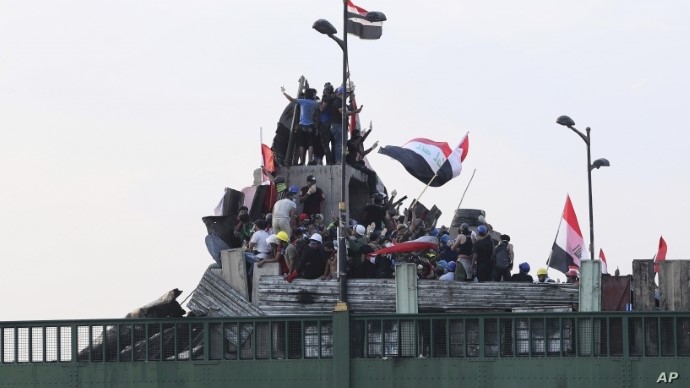Reporting by PMOI/MEK
Iran, November 13, 2019—Iraqi political parties agreed on maintaining the government of Iraqi Prime Minister Adel Abdul-Mahdi in power, according to Agence France Presse reporting on Saturday, November 9. Numerous sessions were held with the participation of Iraqi political parties and groups, emphasizing on need for reforms and ending the protests.
Qasem Soleimani, head of the Iranian regime’s Revolutionary Guards (IRGC) Quds Force, had also participated in these sessions. In Najaf, southern Iraq, Soleimani met with the son of Grand Ayatollah Ali al-Sistani and Sadrist leader Muqtada Sadr, leading to their support behind Abdul Mahdi’s government. The office of Mr. Sistani, however, issued a statement on the same day emphasizing Iraq’s senior religious scholar is not a party in any agreement based on maintaining the current government in power and ending the protests.
News of this “agreement” came out in the early morning hours of Saturday and Iraqi security forces were able to gain control over Baghdad’s three main bridges closed by demonstrators during the past few weeks. At a first glance, it appeared that Tehran, through Soleimani, was able to unite its associated parties and proxies behind an initiative to crackdown against the current protests.
Spreading the word about this “agreement” was apparently planned to install a sense of disappointment among Iraqi protesters. This was parallel with cutting off internet access, opening direct fire on demonstrators, inflicting heavy casualties among the protesters in Baghdad, Basra and other cities, and in effect, quelling the nation’s will.
The Iraqi people, however, had other plans in mind.
Refusing to retreat and go home, the Iraqi people have shown utter bravery and courage, and the results have been astonishing. On Saturday and Sunday, they continued their presence in various squares day and night, with some reports claiming over a million had rallied in Baghdad’s Tahrir Square and its adjacent streets. The protesters were seen launching numerous charges against the oppressive security forces and setting fire to government buildings. As a result, government security forces were forced to make major retreats and the demonstrators regained control over Baghdad’s three main bridges linking the capital’s east and west branches.
On Sunday evening, as signs indicated a complete failure of the crackdown initiative led by IRGC Quds Force chief Qasem Soleimani, another senior level meeting was held in the house of Iraqi President Barham Salih with Prime Minister Abdul Mahdi and Iraqi Parliament Speaker Mohamed al-Halbousi. All three officials announced their opposition to the use of force to quell the protests.
Most alarming for Tehran is the fact that Iraqi demonstrators are seen chanting, “Iran, out, out!” and setting fire to sites and buildings affiliated to militia groups affiliated to the Iranian regime.#Iran#Iraqhttps://t.co/7SUCTyx4ly
— People’s Mojahedin Organization of Iran (PMOI/MEK) (@Mojahedineng) October 4, 2019
This marked the beginning of Iraq’s political developments kicking into a new gear.
On Monday, the United Nations deputy spokesperson held a press conference emphasizing that UNAMI, the UN representative office in Iraq, has reiterated to all Iraqi parties the principles they must respect: protecting the right to life, guaranteeing peaceful demonstrations, freedom of speech, and full accountability of those involved in attacking the demonstrators.
In further developments, UNAMI chief Jeanine Hennis-Plasschaert met with Ayatollah al-Sistani in Najaf and saying Mr. Sistani supports rooted reforms in Iraq. Senior Iraqi officials are not serious in implementing reforms and the demonstrators will not leave the streets until all their demands are met, Mr. Sistani added.
The White House also weighed in by issuing a statement indicating the United States’ demand from the Iraqi government to stop the use of violence against protesters, implement elections reforms and hold early elections.
These signs all indicate Iraq entering a new phase and surpassing the point of no return. This country is on the verge of a democratic revolution. However, for Tehran this is not merely a storm or a volcano threatening a neighbors’ house. This is an uprising aimed at evicting the mullahs’ regime from Iraq and those sitting on the throne in Tehran understand very well how their fate is intertwined with that of Iraq.
The Iraqi people chanting “Iran, out, out!” is the beginning of the end of the mullahs’ regime.
Karbala, southern #Iraq
“Iran, out, out! Karbala will be free!”#Iranpic.twitter.com/KxpGutn7JE— People’s Mojahedin Organization of Iran (PMOI/MEK) (@Mojahedineng) November 8, 2019





